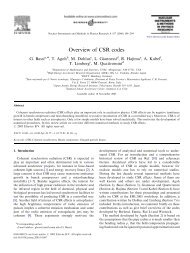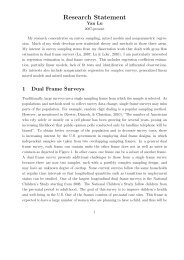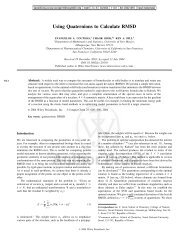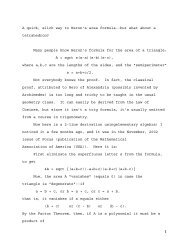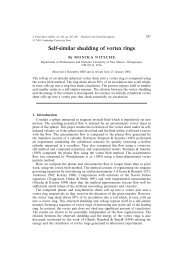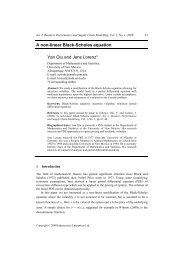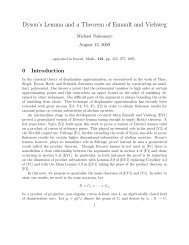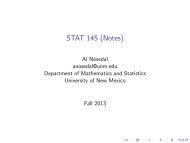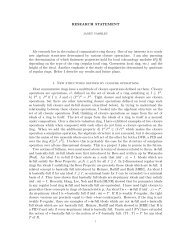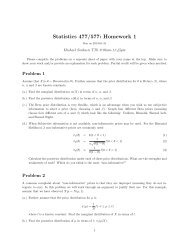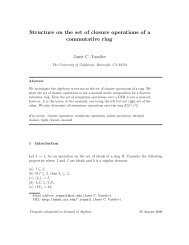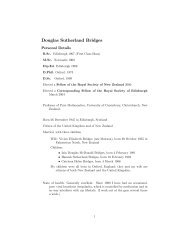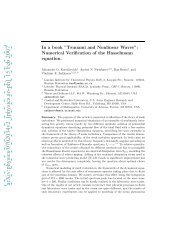OEO Office of Equal Opportunity - Department of Mathematics and ...
OEO Office of Equal Opportunity - Department of Mathematics and ...
OEO Office of Equal Opportunity - Department of Mathematics and ...
Create successful ePaper yourself
Turn your PDF publications into a flip-book with our unique Google optimized e-Paper software.
278 ARTS AND SCIENCES<br />
360. [360./560.] Human Learning <strong>and</strong> Memory. (3)<br />
How humans acquire <strong>and</strong> use knowledge. Theoretical <strong>and</strong><br />
applied issues discussed around the topics <strong>of</strong> memory<br />
structures, attention, forgetting, mnemonics, imagery <strong>and</strong><br />
individual differences in memory.<br />
Prerequisite: 260 or 265.<br />
362L. Human Learning <strong>and</strong> Memory Laboratory. (2)<br />
Laboratory projects related to topics in 360.<br />
Prerequisite: 200. Co- or prerequisite: 360.<br />
364./564. Psychology <strong>of</strong> Perception. (3)<br />
Study <strong>of</strong> the methods organisms use to gain information about<br />
objects. The sensory processes are discussed as a basis for<br />
description <strong>of</strong> more complex perceptual phenomena.<br />
Prerequisite: 260 or 265.<br />
365. Applied Experimental Psychology. (3)<br />
Application <strong>of</strong> theory, methods <strong>and</strong> data from experimental<br />
psychology to topics such as training, education, assessment,<br />
design <strong>of</strong> human-machine interfaces, the legal pr<strong>of</strong>ession,<br />
consumerism <strong>and</strong> environmental systems.<br />
Prerequisite: 265.<br />
**367. Psychology <strong>of</strong> Language. (3)<br />
(Also <strong>of</strong>fered as LING 367 <strong>and</strong> 567.) Theoretical <strong>and</strong> methodological<br />
issues in psycholinguistics, including comprehension,<br />
speech perception <strong>and</strong> production, language acquisition,<br />
bilingualism, brain <strong>and</strong> language, reading.<br />
Prerequisite: 265 or LING 292.<br />
374. Cross-cultural Psychology. (3)<br />
Impact <strong>of</strong> culture on human behavior, learning, personality<br />
<strong>and</strong> other selected topics is examined. Course emphasizes<br />
critical analysis, discussion <strong>and</strong> writing about cross-cultural<br />
research <strong>and</strong> theory.<br />
Prerequisite: 220 or 271.<br />
375. Psychology <strong>of</strong> Women. (3)<br />
(Also <strong>of</strong>fered as WMST 375.) Survey <strong>of</strong> research <strong>and</strong> theory<br />
on gender-role stereotypes <strong>and</strong> gender differences in such<br />
contexts as interpersonal relations, the family, the work force,<br />
mass media, mental <strong>and</strong> physical health.<br />
Prerequisite: 105.<br />
375L. Social Psychology Laboratory. (2)<br />
Laboratory projects relevant to topics in 377 <strong>and</strong> 378 with<br />
discussion <strong>of</strong> research issues unique to social psychology.<br />
Prerequisite: 200. Pre- or corequisite: 377 or 378. Four hrs.<br />
lab.<br />
378./578. Social Interaction. (3)<br />
In-depth examination <strong>of</strong> interpersonal <strong>and</strong> group processes<br />
such as conformity, cooperation, competition, prejudice,<br />
conflict resolution <strong>and</strong> the sharing <strong>of</strong> limited resources.<br />
Includes discussion <strong>of</strong> formal (algebraic, computer-simulation)<br />
models.<br />
Prerequisite: 271.<br />
391. Junior Honors Seminar. (3)<br />
Discussion <strong>of</strong> the history <strong>and</strong> systems <strong>of</strong> psychology, philosophy<br />
<strong>of</strong> science <strong>and</strong> research methodology, particularly as<br />
related to current topics in psychology.<br />
Prerequisites: 260 or 265. Pre- or corequisite: 302. {Fall}<br />
392. Junior Honors Seminar. (3)<br />
Continuation <strong>of</strong> 391. {Spring}<br />
*400. History <strong>of</strong> Psychology. (3)<br />
An introduction to the major developments <strong>and</strong> individuals in<br />
the history <strong>of</strong> psychology.<br />
Prerequisite: any 300-level psychology course.<br />
421./521. Advanced Developmental Psychology. (3)<br />
Investigation <strong>of</strong> the theoretical bases <strong>and</strong> critical issues in the<br />
area <strong>of</strong> developmental psychology.<br />
Prerequisite: 324 or 329.<br />
422./522. Child Language. (3) Morford, John-Steiner<br />
(Also <strong>of</strong>fered as LING 460.) Theories, methodologies <strong>and</strong><br />
findings in child language, from birth to late childhood.<br />
Emphasizes implications <strong>of</strong> child language data for linguistic<br />
<strong>and</strong> psycholinguistic theories. Topics: biological foundations;<br />
pre-linguistic communication; phonological, syntactic, semantic<br />
<strong>and</strong> pragmatic development; bilingualism.<br />
Prerequisites: 324, 328 or 329.<br />
430./530. Alcoholism. (3)<br />
Causes, course, prevention <strong>and</strong> treatment <strong>of</strong> problem drinking.<br />
Prerequisite: 332.<br />
434. Behavior Therapies. (3)<br />
A survey <strong>of</strong> clinical behavior therapies, including techniques<br />
based upon learning theory, self-control, cognitive <strong>and</strong> social<br />
psychological principles. Emphasis is upon treatment outcome<br />
research <strong>and</strong> the practical application <strong>of</strong> methods to<br />
clients’ life problems.<br />
Prerequisite: 332.<br />
436./536. Family Psychology. (3)<br />
Focuses on the major theoretical approaches to family dysfunction<br />
<strong>and</strong> examines family influences on the development<br />
<strong>and</strong> maintenance <strong>of</strong> deviance, including juvenile delinquency,<br />
substance abuse, anorexia nervosa, depression <strong>and</strong> schizophrenia.<br />
Prerequisite: 332.<br />
439./539. Child Psychopathology. (3)<br />
Theories <strong>and</strong> practices related to an underst<strong>and</strong>ing <strong>of</strong> children<br />
<strong>and</strong> adolescents who deviate from normal development<br />
either intellectually, educationally, emotionally, physically<br />
or in some combination. Relevant family variables are<br />
considered.<br />
Prerequisites: 324, 329, 332.<br />
442. Neuronal Plasticity <strong>and</strong> Behavior. (3)<br />
Emphasis on experimental studies <strong>of</strong> behavioral recovery<br />
after brain injury.<br />
Prerequisite: 240.<br />
450./650. Special Topics in Psychology. (1-3, no limit)<br />
∆<br />
Study <strong>of</strong> any psychological topic not otherwise included in the<br />
curriculum upon expression <strong>of</strong> mutual interest by students<br />
<strong>and</strong> faculty. {Offered upon dem<strong>and</strong>}<br />
*467. The Science <strong>of</strong> Intelligent Systems. (3)<br />
(Also <strong>of</strong>fered as CS 438.) Concepts <strong>of</strong> intelligence from<br />
psychology <strong>and</strong> computer science. Areas considered include<br />
production systems, expert systems, computer assisted<br />
instruction, models for semantics <strong>and</strong> human cognitive processes<br />
from pattern recognition to output systems. Includes<br />
a project.<br />
Prerequisite: 265.<br />
*469L. Experimental Psycholinguistics. (3)<br />
(Also <strong>of</strong>fered as LING 469L <strong>and</strong> 569L.) Laboratory course<br />
in psycholinguistics; review <strong>of</strong> classic issues <strong>and</strong> research.<br />
Provides an opportunity to learn basic research methods in<br />
experimental psycholinguistics <strong>and</strong> gain skills necessary to<br />
conduct independent research.<br />
Prerequisite: 367 <strong>and</strong> (302 or STAT 145)<br />
491. Senior Honors Seminar. (3)<br />
Experimental methods <strong>and</strong> laboratory techniques. Senior<br />
thesis based on independent research.<br />
Prerequisite: 392. Three hrs. lab. {Fall}<br />
492. Senior Honors Seminar. (3)<br />
Continuation <strong>of</strong> 491. Three hrs. lab. {Spring}<br />
499. Undergraduate Problems. (1-3 to a maximum <strong>of</strong> 6) ∆<br />
Restriction: permission <strong>of</strong> instructor.<br />
501. Advanced Statistics. (3)<br />
Frequency <strong>and</strong> probability distributions; sampling distributions<br />
<strong>and</strong> point estimation; central tendency, variability <strong>and</strong> z<br />
UNM CATALOG 2006–2007 Symbols, page 611.



